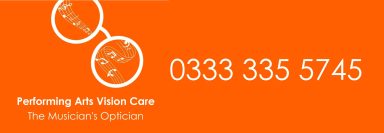VR Technology and
eye disorders
What visual gaze
analysis tells us
Eye disease and the performer
Eye disease appears to have a greater impact on performers than on the general population. Eye disease or vision loss frequently jeopardise the careers of musicians and performers. While presbyopia makes it difficult for older musicians to focus on their music on stage, eye disease can make things even harder.
Age-related macular degeneration
Age-related macular degeneration, or AMD, can result in blurred or distorted vision, particularly when looking directly at something, such as sheet music. Straight lines may appear wavy or crooked, and some areas of print may appear smaller than usual. Dark, empty, or blind spots may appear in the center of your vision. These are known as scotomas. This can significantly impair the performers' vision, but it does not mean they should stop playing. However, by using VR technology, we can help some performers overcome these difficulties by using a variety of lens solutions to move the image onto undamaged areas of the retina or applying high contrast filters to enhance visual performance.
Diabetic Retinopathy
Diabetes can damage the retina, causing diabetic retinopathy. Untreated, it can cause blindness.Diabetic retinopathy usually takes years to threaten vision.
Blood vessel walls weaken, causing tiny bulges that leak blood into the retina. White spots on the retina and vision loss can result. Later on, retinal blood vessels bleed into the vitreous, a gel-like eye fluid. It can cause cobweb-like dark spots or streaks.
The macula, a retinal component, swells in diabetic retinopathy. Blurry vision and small blind spots can result from macular edema. Early intervention reduces swelling and preserves vision.
Diabetic retinopathy can impair performers' vision, but they shouldn't retire. We can help some performers overcome these challenges by using VR technology to help us understand where they perceive their blind spots and field loss.
Retinitis pigmentosa
RP is one of several genetic retinal dystrophy disorders that cause vision loss. It affects both night vision and peripheral vision. Blindness is rare, but "tunnel vision" may develop as peripheral vision declines.
Our VR technology allows clients to try various colour filters and give a subjective response to different filters and tints as if they were applied to their lenses. We've discovered that orange lens tints or filters help RP patients. Many RP patients preferred a 520nm orange filter, which improved vision. By increasing contrast sensitivity, yellow and orange lenses may improve clients' overall vision. Although subjective, client feedback and satisfaction are important to us. We don't have a cure for RP, but helping clients maximise their vision can change RP performers' lives.
VR technology and performers' visual acuity.
Visual defects caused by cataracts, glaucoma, macular dystrophy, and trauma can all be treated with VR technology.
Why not make an appointment and try the innovative Kudos experience for yourself? You'll get a copy of your personalised heat map, as well as the chance to speak with a Kudos-trained optician about how this transformative technology can improve your view of the world around you.
Do not pass up this exciting opportunity. Schedule your KUDOS experience today and begin creating your own unique lens solution.
Schedule your vision assessment today and prepare to see the future of vision care!
©Copyright. All rights reserved.
We need your consent to load the translations
We use a third-party service to translate the website content that may collect data about your activity. Please review the details in the privacy policy and accept the service to view the translations.
